 Petzlover
Petzlover Both Pixie-bob and Ragamuffin are originated from United States. Both Pixie-bob and Ragamuffin are having almost same weight. Pixie-bob may live 3 years less than Ragamuffin. Both Pixie-bob and Ragamuffin has same litter size. Pixie-bob requires Low Maintenance. But Ragamuffin requires Moderate Maintenance
Both Pixie-bob and Ragamuffin are originated from United States. Both Pixie-bob and Ragamuffin are having almost same weight. Pixie-bob may live 3 years less than Ragamuffin. Both Pixie-bob and Ragamuffin has same litter size. Pixie-bob requires Low Maintenance. But Ragamuffin requires Moderate Maintenance
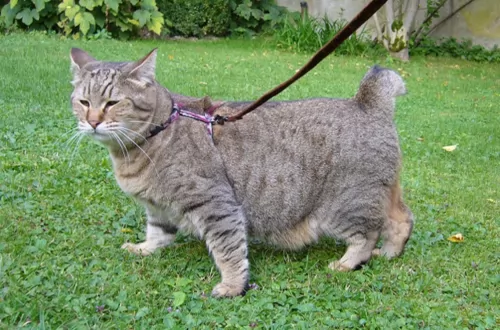 The Pixie-Bob breed is thought to have started from the unplanned litter of a bobcat and a barn cat in 1985. The whole idea of the Pixie-Bob was to get a cat that resembled the North American Bobcat.
The Pixie-Bob breed is thought to have started from the unplanned litter of a bobcat and a barn cat in 1985. The whole idea of the Pixie-Bob was to get a cat that resembled the North American Bobcat.
The barn cat belonged to Carol Ann Brewer, and she named a female kitten Pixie. Pixie became the foundation mother for this breed.
In fact, it was in 1989 that she wrote the first breed standard, naming the breed Pixiebob, in honor of Pixie. In 1998, the Pixiebob achieved TICA championship status. Today, the International Cat Association (TICA) recognizes the Pixie-Bob as a breed.
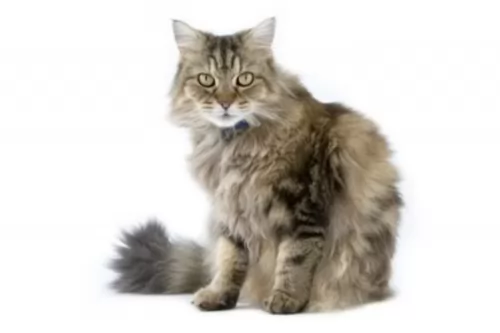 The beautiful Ragamuffin cat is a domestic feline that was established as a separate breed in 1994. It is a variant of the Ragdoll cat.
The beautiful Ragamuffin cat is a domestic feline that was established as a separate breed in 1994. It is a variant of the Ragdoll cat.
It was during the 1960s that a regular long-haired cat that was also white and non-pedigreed produced different litters of kittens, one of which was an unusually docile litter of kittens.
The history of the RagaMuffin can in fact be traced back to the founder of the Ragdoll cat breed, Ann Baker. Breeders working with Ann decided to create their own breed, the Ragamuffin, in 1994. It is a fairly new breed and the Ragamuffin has inherited quite a lot of the Ragdoll cat’s qualities. It arrived in the UK in 2009.
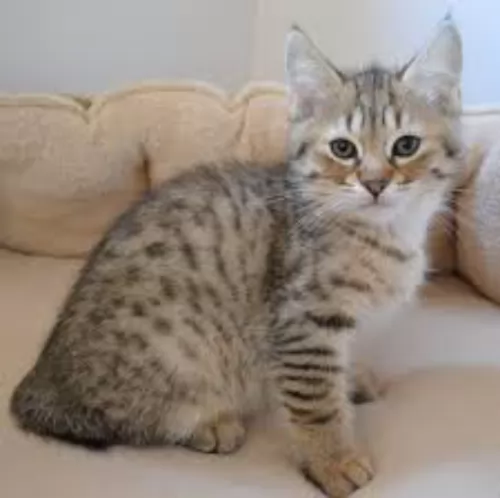 The Pixie-Bob is a medium to large cat that can weigh up to about 8kg. They stand between 25 and 33cm in height.
The Pixie-Bob is a medium to large cat that can weigh up to about 8kg. They stand between 25 and 33cm in height.
It's a muscular cat. These cats have a thick double coat which can be short-haired or long-haired. Most times they have a striped coat pattern with some rosettes. In fact, the pattern on the fur is much like that of a Bobcat.
Their eyes are triangular shaped and they have quite a distinctive heavy brow. The eyes are usually a honey color or they can be green. The tail is rumpy or non-existent or it can be a few inches in length. Sometimes the ears will have some feathering at the tips.
They are polydactyl which means that with their paws, they have more than the regular number of digits.
In spite of there being a wild side to this coat, they are amicable, fairly laid-back type of cats. Pixie-Bobs enjoy being with their owners, loving to quietly spend time with their human beings.
They’re not cats that form a strong bond with just one family member, but they are friendly with everyone in the family. When a stranger calls, they may run off however, to hide in a safe spot.
Some people describe them as dog-like. These cats also have a love for water so don’t be surprised if you see him spending a lot of time playing around his water bowl. This is a cat that just loves being the center of everything that is going on, and yet he has a calm aura about him.
The Pixiebob is talkative, chirping and chattering away as he tells you about what he has got up to during the day.
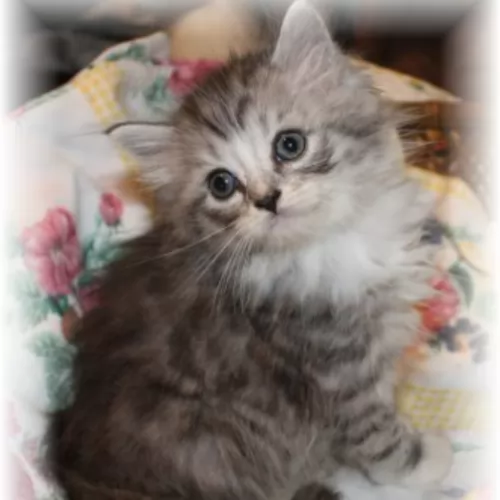 Ragamuffins are large, muscular cats and some of the larger ones can weigh up to 9kg.
Ragamuffins are large, muscular cats and some of the larger ones can weigh up to 9kg.
The chest of the cat is broad, he has a broad head and a well-plumed tail. These medium- to semi-longhaired cats have a thick, plush, silky coat with a ruff around the neck.
The coat is available in a number of colors and patterns, but popular colors are tabby with white, brown, blue and tortoiseshell. The nose of the Ragamuffin is shorter than that of the Ragdoll and the eyes are walnut-shaped. The eyes can be green, blue, or gold.
The Ragamuffin cat is a little bit more energetic than the Ragdoll and is a loving, loyal member of his human family. He is a large but docile cat. These cats are amicable, playful and also intelligent.
Many people train them to walk easily on a leash. They make great companions for single people or families.
Calm and unruffled, he makes the perfect family pet. People are always ready to make a fuss of them because of their beauty and they are always ready to lap up the attention. In fact, these big cats are so fond of attention from their owners that they don’t like being left alone for long periods of time.
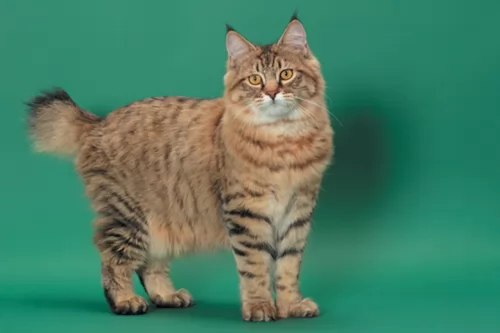 The Pixie-Bob just loves being around his human family and he forms strong bonds with them.
The Pixie-Bob just loves being around his human family and he forms strong bonds with them.
They are social cats and like a dog, they try to become involved in the going-on of the family. By treating this cat well and providing him with a loving home, he is capable of making you a most amicable and energetic member of the family.
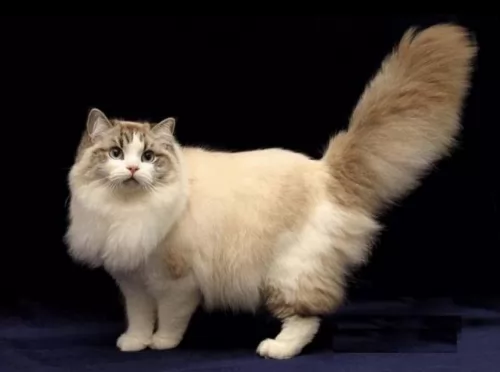 Your RagaMuffin promises to make you a splendid pet. He is such an amicable cat, being social and friendly with his human family.
Your RagaMuffin promises to make you a splendid pet. He is such an amicable cat, being social and friendly with his human family.
He also gets along with your visitors and any other pets you have in the house. Children love his playful, easy-going nature.
Having a Ragamuffin cat in your home is such a pleasure and this large cat is willing to go out of his way to be the perfect pet and companion for you.
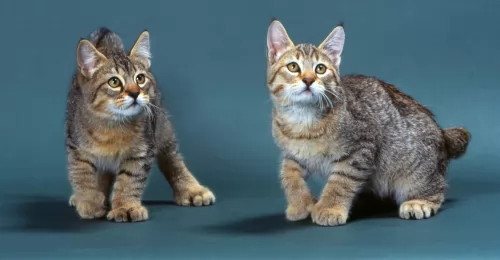 These are healthy cats and they don’t easily get sick. There are always some cat health issues that can crop up with any cat, and with the Pixie Bob, they seem to battle with delivering litters.
These are healthy cats and they don’t easily get sick. There are always some cat health issues that can crop up with any cat, and with the Pixie Bob, they seem to battle with delivering litters.
Sometimes you will hear of Cryptorchidism in these cats which means there is the absence of the testes or scrotum.
Whatever health issues your cat has, always make sure that you get him to the vet for his immunizations as well as for check-ups.
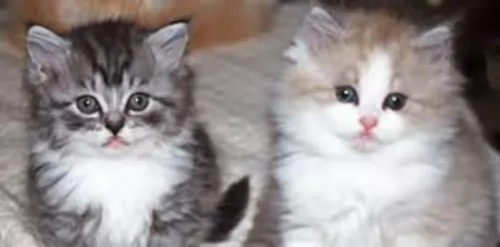 Ragamuffins are healthy cats with no known inherited diseases, but as with all cats you want to know something of the diseases that can plague cats.
Ragamuffins are healthy cats with no known inherited diseases, but as with all cats you want to know something of the diseases that can plague cats.
You’ll want to check that your Ragamuffin has been tested for Hypertrophic cardiomyopathy as well as Polycystic kidney disease.
This is a commonly diagnosed cardiac disease in cats. Feline Hypertrophic Cardiomyopathy causes the muscular walls of a cat's heart to thicken. The heart can no longer work sufficiently. It seems as though genetics plays a role as there are some cats that seem to battle with this disease more than others.
If you catch the disease early enough, the vet can devise a treatment plan to improve the cat’s quality of life.
Although you find this disease more frequently in Persian cats, this inherited disorder can be found in other cat breeds too. Liquid-filled sacs develop in the kidneys, growing in size and taking over kidney tissue which ultimately leads to kidney failure. Your cat will have nausea, vomiting, weight loss, and lethargy, and your cat will have to get to the vet.
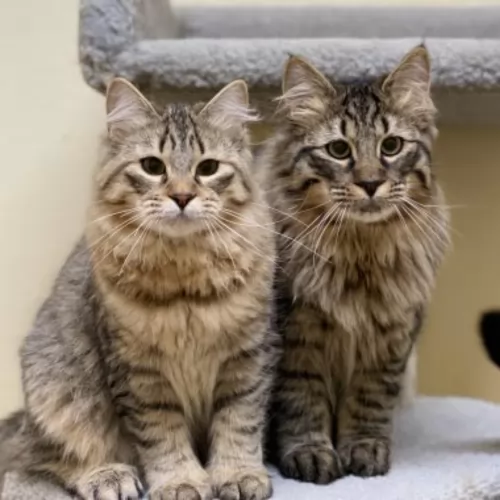 Pixie-bobs don’t require any special diet. When it comes to commercially manufactured cat foods, there are wet foods, dry foods and combination foods. You’ll find out what your cat likes, but remember that a cat is a carnivore and that meat is what they eat.
Pixie-bobs don’t require any special diet. When it comes to commercially manufactured cat foods, there are wet foods, dry foods and combination foods. You’ll find out what your cat likes, but remember that a cat is a carnivore and that meat is what they eat.
Always go for high-quality foods if you are able to because the best foods are better able to keep your cat healthy. The nutritional needs of a cat change as he grows and matures and there are cat foods specially manufactured for every season of your Pixie-Bob’s life.
Always ensure that there is a bowl of clean, fresh, cool water available to your cat.
The short hair of the Pixie-Bob means that it will be easy to give your cat a brush once a week to remove loose hairs.
Always get your cat to the vet when he shows signs of illness. If he comes to you as a kitten he will need his vaccinations as well as worm medicine. Your vet will inform you when to bring you cat in for the next round of vaccinations.
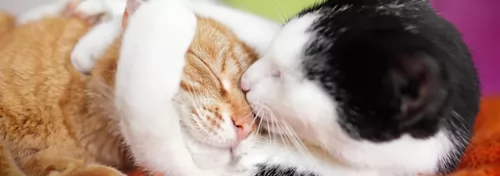 The Ragamuffin's longish coat will require some brushing at least once a week to keep it soft and silky.
The Ragamuffin's longish coat will require some brushing at least once a week to keep it soft and silky.
These are big cats so you will need to provide him with an adequate diet. He is a carnivore and will therefore require meat.
Kittens will eat 4 meals a day while the adult Ragamuffin can have 2 bowls of food. Cats can sometimes be fussy eaters so you want to be sure to give him what he likes from the wet and dry cat goods you get.
The better quality food he eats, the healthier he will be. Your Ragamuffin's dietary needs will also depend on his age.
He should never be without a constant supply of fresh, cool water.
If you have any questions about how to look after your Ragamuffin in the best possible way, speak to your local vet.